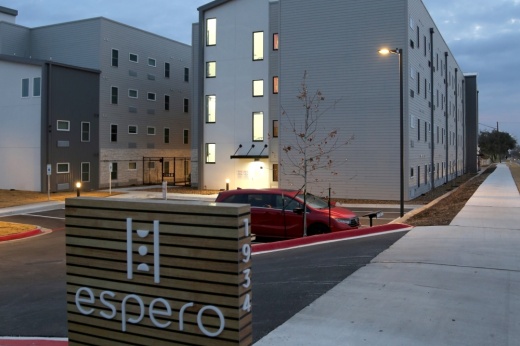The setup
Espero Rutland opened in early February in North Austin. Partly-owned by Caritas of Austin, the supportive housing development provides housing, education, employment and food support to people experiencing homelessness, as well as connections to mental and physical health services.
According to Espero Rutland representatives, GFiber infrastructure has been built to provide free internet to all 171 residential units.
“These are folks who don't necessarily have the means to subscribe to high speed, reliable services like Google Fiber,” said John-Michael Cortez, government and community affairs manager of GFiber. “Even though our service is generally very affordable, it's probably beyond the reach of many of those households.”
A closer look
Cortez said that Espero Rutland is part of GFiber’s gigabit communities program, and that in Austin, targeting permanent supporting housing is a “new twist” for the program.
“Austin, like many other U.S. cities, has renewed focus on addressing homelessness,” Cortez said. “One of the city's strategies has been to rapidly develop a much greater number of supportive housing units in the city. So it seemed like a natural next step with our programs and our digital inclusion. ... It’s really exciting how much activity there is these days around permanent supportive housing in our city, as it's widely considered the actual long-term, best solution to address what so many U.S. cities are facing.”
According to Cortez, digital inclusion is a three-legged stool consisting of access, affordability and adoption.
Catherine Crago, head of strategic initiatives and resource development at HACA, said that GFiber and HACA’s “unique program” has been able to further the digital inclusion stool.
“It’s not [that] you buy broadband and throw it over a wall and then community develops,” Crago said. “And it's not that you throw some laptops over the wall or hand them out from a truck somewhere. ... This is what Google Fiber has been tuned into and committed to, not just in philosophy and theory, but in practice. [Access, affordability and adoption] have to be deployed simultaneously to build the community.”
Diving in deeper
Along with providing internet, Cortez said that GFiber is helping fund the Caritas program, which provides laptops and digital literacy classes for Espero residents.
According to Cortez, these classes could involve anything from the basics, such as how to operate a laptop and tips for navigating the internet safely, to more complex topics, such as how to use word processors or utilize online utility systems and other public benefits.
“There’s all sorts of different things that those of us who are kind of digital natives ... just take for granted,” Cortez said.
Why it matters
“Even after the pandemic, the way that we work, the way that we go to school, the way that many people access health care services, and entertainment, have changed irrevocably,” Cortez said. “So much of our lives are done via the internet. If we want a community and a society where everybody has the opportunity to thrive—to fully participate in our economy, our democracy, our culture—everybody needs to have access.”
Also of note
Cortez said that the creation of the Affordable Connectivity Program, a $14.2 billion program that has provided low-to-moderate-income households with subsidized internet service since 2022, has been a “real game changer.”
However, April is the last fully funded month of the program, according to the Federal Communications Commission. Over 23 million households currently receive the monthly discount.
“The imminent ending of that program, and Congress’ inability to maintain funding for that program, is a real setback to ensuring both affordability and access,” Cortez said. “I think you will find that it is something that you'll hear from all internet service providers that that program is vitally important to maintaining access for millions of Americans, millions of Texans, and hundreds of thousands of households here in Central Texas. ... [GFiber is] doing as much as we can here, but it's going to take, like so many issues, solutions at scale—like ACP, like broadband—to be programmed at the federal level that actually make a huge dent in digital inclusion.”





